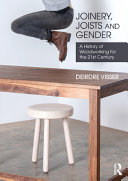

Most ebook files are in PDF format, so you can easily read them using various software such as Foxit Reader or directly on the Google Chrome browser.
Some ebook files are released by publishers in other formats such as .awz, .mobi, .epub, .fb2, etc. You may need to install specific software to read these formats on mobile/PC, such as Calibre.
Please read the tutorial at this link: https://ebookbell.com/faq
We offer FREE conversion to the popular formats you request; however, this may take some time. Therefore, right after payment, please email us, and we will try to provide the service as quickly as possible.
For some exceptional file formats or broken links (if any), please refrain from opening any disputes. Instead, email us first, and we will try to assist within a maximum of 6 hours.
EbookBell Team

0.0
0 reviewsJoinery, Joists and Gender: A History of Woodworking for the 21st Century is the first publication of its kind to survey the long and rich histories of women and gender non-conforming persons who work in wood. Written for craft practitioners, design students, and readers interested in the intersections of gender and labor history—with 200 full-color images, both historical and contemporary—this book provides an accessible and insightful entry into the histories, practices, and lived experiences of women and nonbinary makers in woodworking.
In the first half the author presents a woodworking history primarily in Europe and the United States that highlights the practical and philosophical issues that have marked women’s participation in the field. Research focuses on a diverse range of practitioners from Lady Yun to Adina White.
This is followed by sixteen in-depth profiles of contemporary woodworkers, all of whom identify fine woodworking as their principal vocation. Through studio visits, interviews, and photographs of space and process, the book uncovers the varied practices and contributions these diverse artisans make to the understanding of wood as a medium to engage spatial, material, aesthetic, and even existential challenges.
Beautifully illustrated profiles include Wendy Maruyama, one of the first women to earn an MFA in woodworking in the US; Sarah Marriage, founder of Baltimore’s A Workshop of Our Own, a woodshop and educational space specifically for women and gender non-conforming makers; Yuri Kobayashi, whose sublime work blurs boundaries between the worlds of art and craft, sculpture, and furniture; and Folayemi Wilson, whose work draws equally on African American history and Afrofuturism to explore and illuminate the ways that furniture and wood traditions shape social relations.